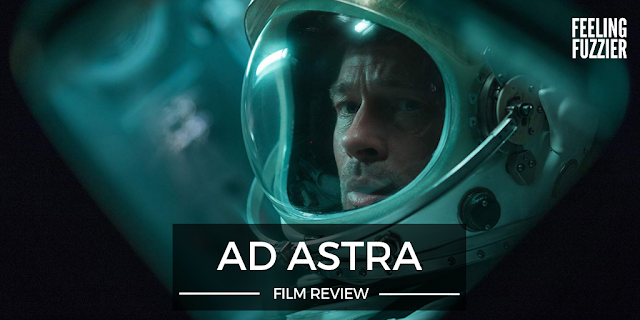Brad Pitt journeys into the stars in search of his absent father in James Gray's sombre and moody spacefaring film, Ad Astra.
 Set in the near future, Brad Pitt plays Major Roy McBride, an emotionally-distant man who survives when a powerful energy surge strikes his space station. The son of celebrated astronaut Clifford McBride (Tommy Lee Jones), Roy is drafted by senior army personnel to investigate the source of the surge – which they suspect is the same as Clifford's last-known location.
Set in the near future, Brad Pitt plays Major Roy McBride, an emotionally-distant man who survives when a powerful energy surge strikes his space station. The son of celebrated astronaut Clifford McBride (Tommy Lee Jones), Roy is drafted by senior army personnel to investigate the source of the surge – which they suspect is the same as Clifford's last-known location.Dispatched on a top secret mission when Roy was a teenager, Clifford has been missing presumed dead for decades – and now it's up to Roy to make the long voyage to Neptune and put a stop to the energy surges that threaten to destroy all life on in the Solar System, and finally learn the truth about his father along the way.
On the surface, Ad Astra sounds like a standard space epic, complete with an interplanetary threat, a chiseled hero and a heart-pounding ticking clock. However, director James Gray hasn't set out to make a bombastic blockbuster, and has instead carefully crafted a sometimes jarringly realistic and tangible depiction of space travel – complete with the same mundanities of travel that one might experience on a long-haul flight today.
This isn't your four-quadrant crowd-pleaser where Pitt can simply hop in a starfighter and race across the stars – in Gray's world, space is quiet and lonely, not an exciting spectrum of colourful adventure. All of this cold emptiness is beautifully captured by cinematographer Hoyte van Hoytema and soundtracked by composer Max Richter.
Of course, all this is in service of the film's themes, which illustrate that Major McBride is as distant, lost and alone as the wayward father he is searching for among the stars. Pitt is quite simply brilliant in Ad Astra, his second fantastic performance of the year and, better still, with a character that is so far removed from the cocksure swagger and bravado of Cliff Booth. With a focused exterior encasing a heart that never races (or even bleeds?), never has a void of emotion and gloomy pessimism been as compelling as it is in Pitt's hands.
 Outwardly, Major McBride is a man of few words; but inwardly, he's increasingly self-reflective and ponderous. Gray uses McBride's inner monologue to keep the audience clued into McBride's mind, as Pitt's distant and thoughtful visage gently starts to waver as his journey nears its conclusion.
Outwardly, Major McBride is a man of few words; but inwardly, he's increasingly self-reflective and ponderous. Gray uses McBride's inner monologue to keep the audience clued into McBride's mind, as Pitt's distant and thoughtful visage gently starts to waver as his journey nears its conclusion.Ad Astra is ponderous and plausible, with a deeply personal narrative that favours introspection over action. The slow, plodding narrative does contain the occasional burst of incident, such as a Mad Max meets Apollo 11 buggy chase across the lunar surface, or a brief aside that sees McBride come face-to-face with an ugly experiment gone awry.
The film's supporting cast are thrust to the fringe, particularly Liv Tyler's neglected and forgotten wife. Rather than a missed opportunity, her absence further cements the film's themes. Tyler is only shown in flashback as an out of focus figure hovering on the edge of the frame, underlining McBride's emotional indifference.
The Verdict: 9/10
A cold and melancholic journey of self-discovery and an exploration of what it means to be a partner and a father, James Gray's Ad Astra is a deliberate and methodical lament that slowly unfurls to reveal a tender and genuinely moving centre.
Ad Astra is in cinemas across Australia now.



No comments:
Post a Comment